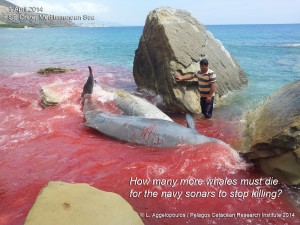U.S. Media Ignores Latest Stranding
Here is an update from my colleague Alexandros Frantzis from the Pelagos Cetacean Research Institute in Greece, who as been actively trying to investigate the full extent of the damage to the population of Cuvier’s beaked whales found in the waters south of Crete.
I recall that exactly in that area, which is well known to be prime habitat for Cuvier’s beaked whales, there has been a naval exercise conducted by Greek, US and Israeli navies. Until the results of the necropsies are known, evidence that the naval exercises have caused the whale deaths must be considered circumstantial. However, this mass stranding perfectly fits in all its details into the definition of “atypical beaked whale mass stranding”, which is well known to be caused by naval sonar.
Message sent by Alexandros Frantzis to ECS-TALK@JISCMAIL.AC.UK on April 6th, 2014 at 16:14 Eastern European Time
Subject: Photo and update on the recent atypical mass stranding of Cuvier’s beaked whales in SE Crete
Dear all,
Following the many tens of e-mails that we received, we would like to express our gratitude for your interest and support and answer some of your questions with an update, now that more data are available.
The atypical mass stranding spanned 2 days (1st and 2nd April ) and involved five single stranding events involving 3, 2, 1, 1 and 1 individuals. According to the analysis conducted so far, a minimum of five (but analysis is on going) and a maximum of seven individuals were recorded (two single standing events concerned the same individual and the two individuals of another event cannot be identified).
The distance between the western and eastern stranding locations for the strandings of the 1st April was 16.5 km in straight line. The single stranding of the 2nd of April occurred 4.1 km further west of the western stranding location of the 1st of April.
(While writing this message and according to preliminary information from the local port-police authorities, three more reports of three different stranding events became available. They occurred the 3rd or 4th, the 5th and 6th April and all involved single animals. The two first concerned live animals re-floated and the last one (today 6th April) a dead animal still being on the beach. All of them occurred at a distance of less than 1 km between each other and took place in a location about 48 km west of the stranding event of the 2nd of April. These news are very important and indicate that the impact of the exercise may concern a very large sea area.)
Two of the stranded whales died (all others were re-floated and not seen so far) and necropsies were performed on both of them (the whale that was disposed according to our first message was recovered). The necropsies were conducted under the guidance of Dr. Anastasia Komnenou, Veterinary School of Aristotle University of Thessaloniki. Please address any questions regarding the necropsies and the histopathological findings directly to her.
At least one of the photos of the stranding event is amazing and can greatly contribute to the conservation of beaked whales. Therefore, we thought that sharing it with the entire cetological community can help our common goal to protect the beaked whales from navy sonar and anthropogenic sound in general. Please feel free to upload and distribute the photo as attached to raise public awareness or for educational purposes (you have no right of use for commercial purposes).
All best,
Alexandros
—
___________________________________________
Dr. Alexandros Frantzis
Scientific director
Pelagos Cetacean Research Institute
Terpsichoris 21
16671 Vouliagmeni,
GREECE
Tel.: +30-210-8960108
e-mail: afrantzis@otenet.gr
website: http://www.pelagosinstitute.gr
___________________________________________

